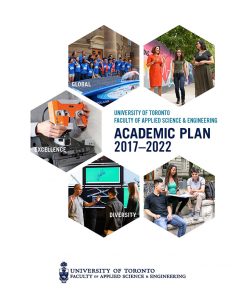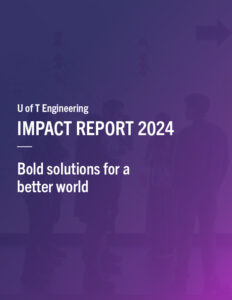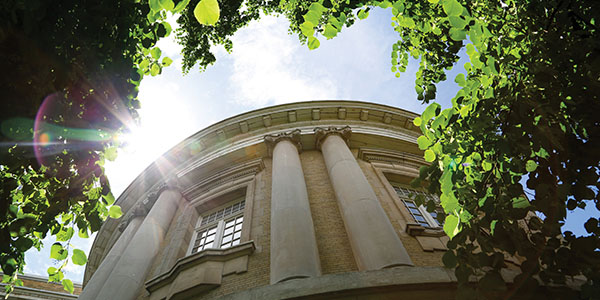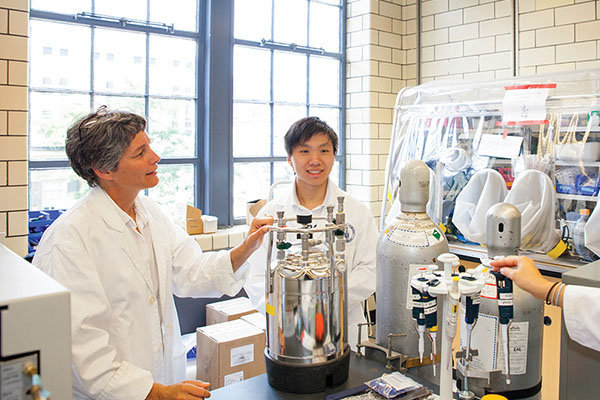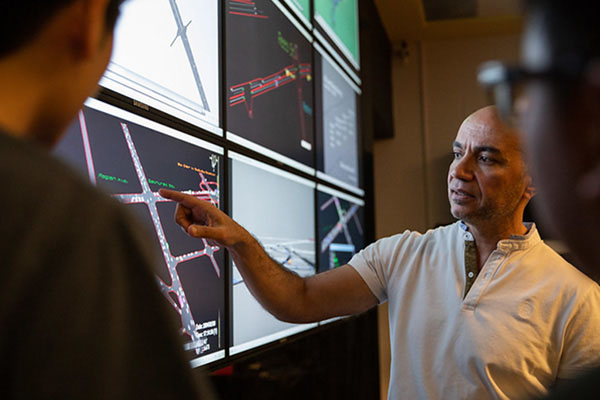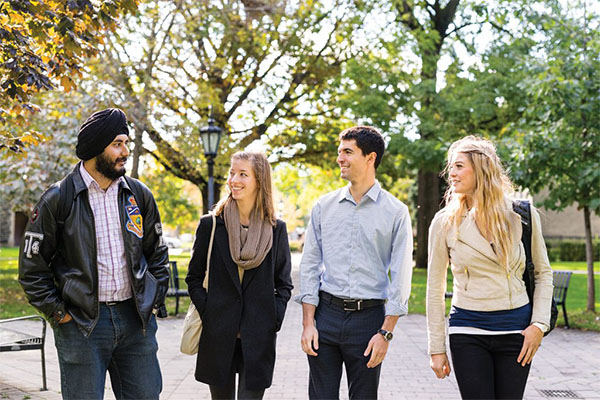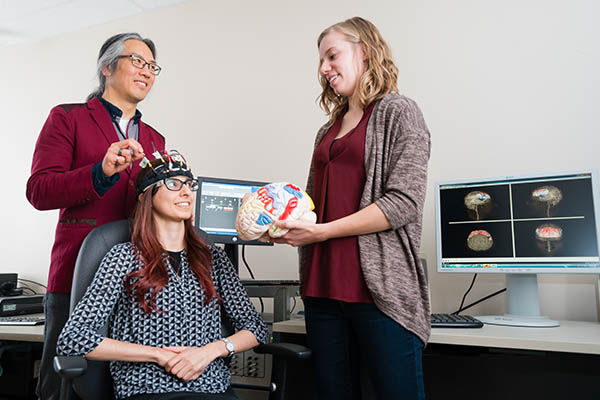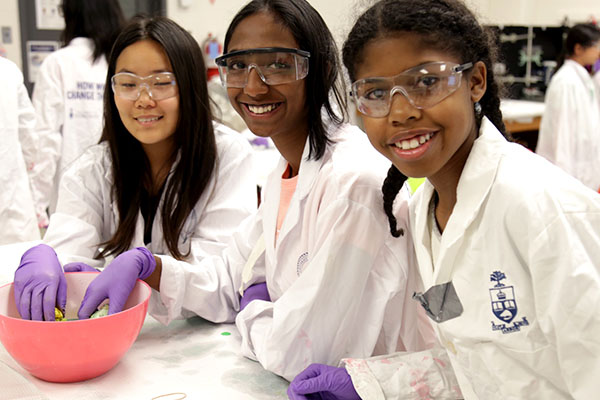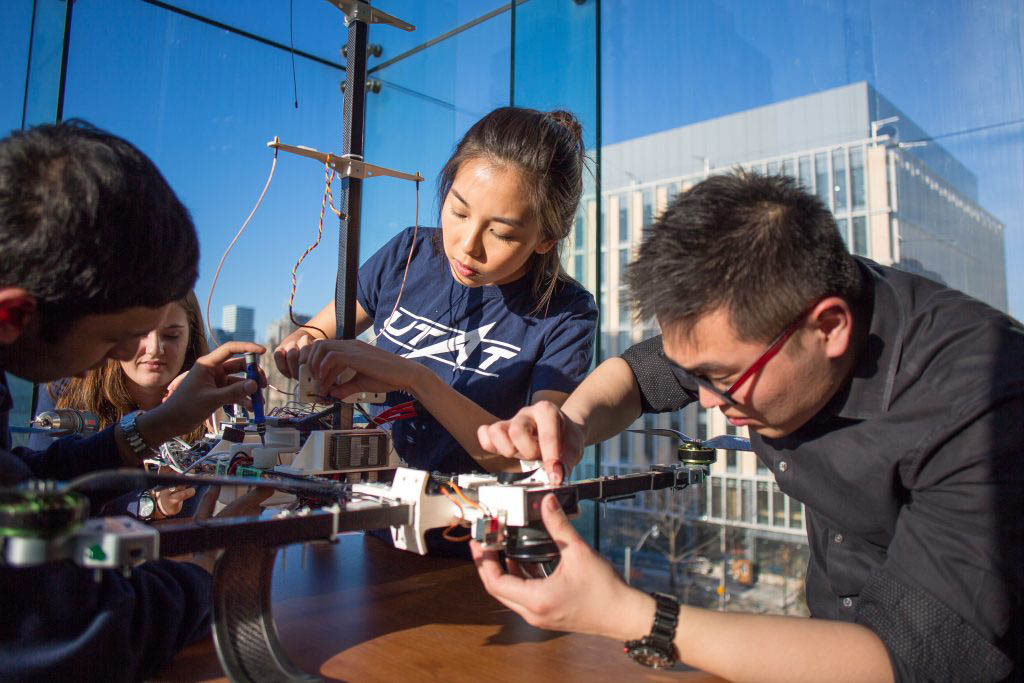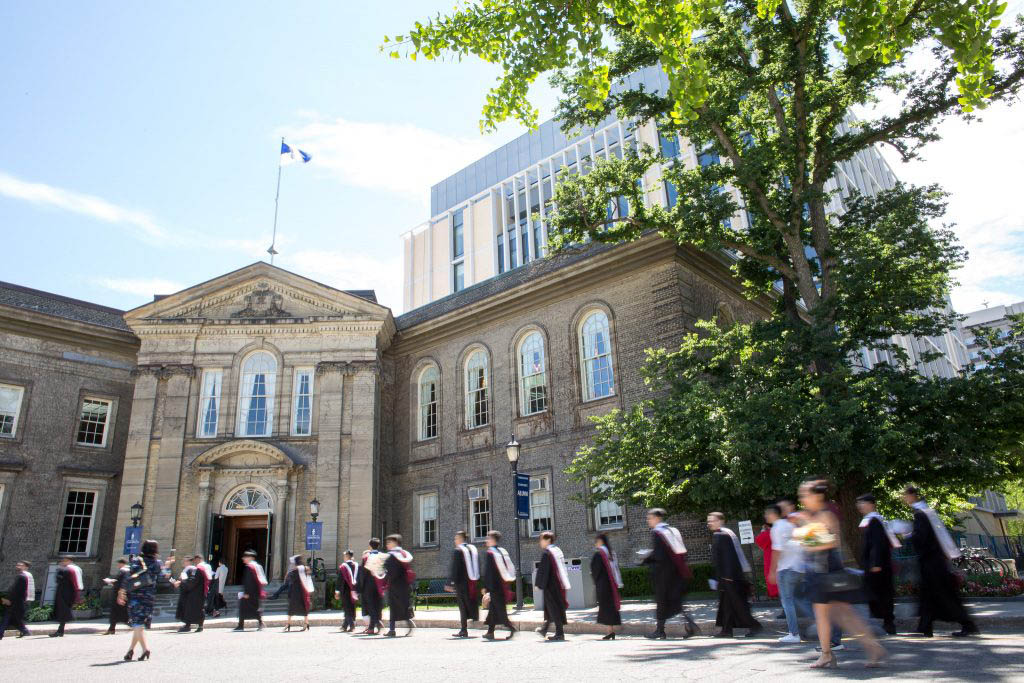The Dean’s Strategic Fund (DSF) was created to serve as a catalyst for innovation, helping to jumpstart initiatives that may not have taken root without seed funding. After nearly 14 years of supporting many successful projects, the Dean’s Strategic Fund has come to a close and is no longer accepting new applications. Active DSF projects will conclude as planned.
Established by Dean Emerita Cristina Amon in 2011 and continued by Dean Chris Yip, the DSF provided more than $50M in seed funding for projects with broad impact across the faculty. As a testament to its success, several DSF-funded initiatives became self-sustaining, permanent additions to U of T Engineering.
These five examples illustrate the transformative and lasting impact of the Dean’s Strategic Fund:
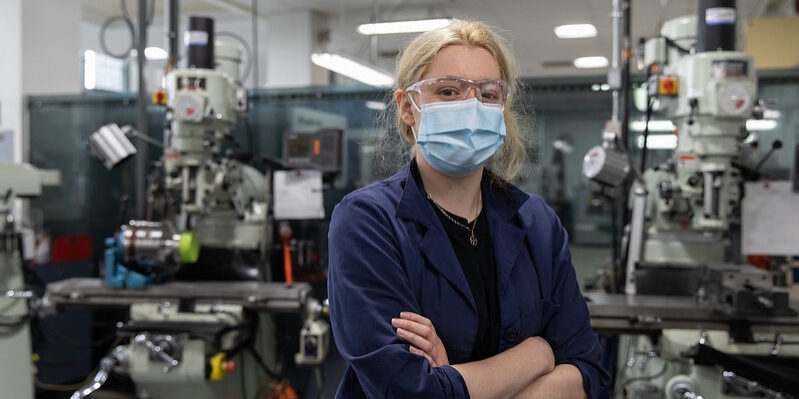
MIE Machine Shop
Where ideas take shape
Design, build, test, repeat: the engineering process has stood the test of time. But while ideation can take place anywhere, creating and testing prototypes requires physical space and advanced equipment, not to mention knowledgeable operators.
Starting in 2014, the DSF has supported several investments in the MIE Machine Shop, which houses state-of-the-art equipment and provides technical services for all U of T Engineering students and faculty. The facility is open to U of T Engineering community members who successfully meet certain requirements, including passing a basic machining course.
Machine Shop technicians also provide professional services to support faculty and student research at MIE and the wider U of T community, including design consultation, precision machining, fitting and assembly of prototypes and custom-designed parts.
PHOTO: Emma Day, Year 2 MechE, works on a project in MIE Machine Shop, October 2021 (Daria Perevezentsev)
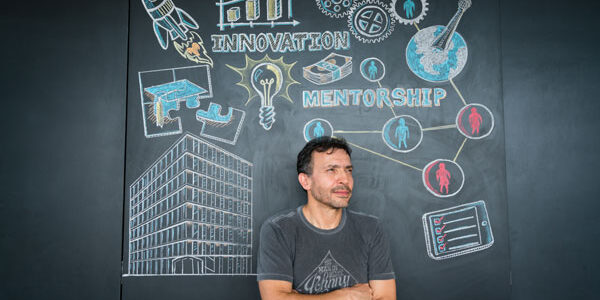
The Entrepreneurship Hatchery
A startup that creates startups
The Entrepreneurship Hatchery is where U of T Engineering students gain their first experience in translating an innovative idea into a viable business. Established in 2012 with DSF funding, the Hatchery provides a full suite of programs and services to nurture a culture of entrepreneurship.
Each summer, dozens of undergraduate student teams apply to the Hatchery NEST program, where they receive mentorship and advice from seasoned professionals on topics including intellectual property, marketing, finance and other areas of business development. They also have access to prototyping facilities and tools, from 3D printers to laser cutters.
Hatchery LaunchLab provides support for research-driven startup companies led by graduate students and faculty, over an extended incubation period of one to two years. The goal is to deliver proof-of-concept for their technology and attract investment from venture capitalists.
Since inception, the Hatchery has launched more than 80 startups, which have collectively raised more than $60 million in seed funding.
PHOTO: Joseph Orozco, executive director of The Hatchery. (Neil Ta)
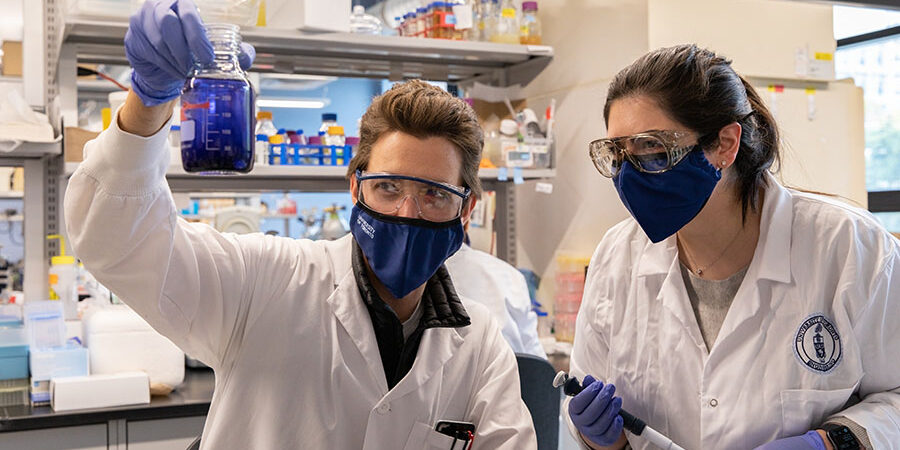
BioZone
Growing the future of bioprocess engineering
Nature was the world’s first biochemical engineer — and it’s still the best. Whether it’s breaking down contaminants that are difficult to degrade or building up bio-based polymers that could displace plastics derived from fossil fuels, catalysts produced by bacteria, fungi and other organisms are the key.
In BioZone, multidisciplinary teams work at the interface of biology and engineering to address urgent societal needs in energy, environment and health. Innovations include:
- KB-1 and KB-1 Plus, microbial cultures that can be introduced into soil to enhance the degradation of chlorinated solvents
- Ardra Bio, which produces sustainably sourced chemicals for use in natural flavors, perfumery and cosmetics formulations
- Double-Fortified Salt, used to combat micronutrient deficiencies in places such as the Indian state of Uttar Pradesh
Graduates of BioZone are highly-qualified personnel who go on to work in a variety of industries related to bioprocess engineering around the world. BioZone and projects within it were supported by DSF grants in 2014 and 2017.
PHOTO: Students in BioZone study the chemical transformations carried out by living organisms to develop innovations in fields ranging from sustainable plastics to environmental remediation. (Daria Perevezentsev)
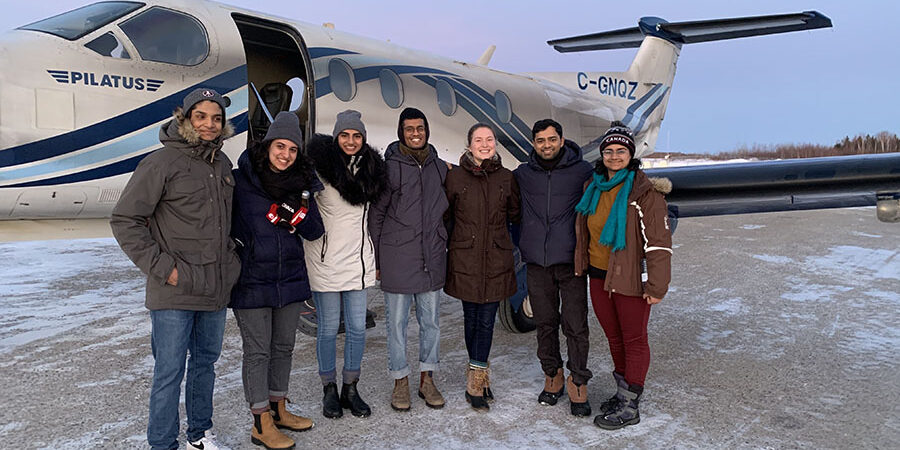
Reconciliation through Engineering Initiative
Building connections with First Nations
Established with DSF funding in 2018, the Reconciliation through Engineering Initiative (RTEI) is an initiative of the Centre for Global Engineering.
RTEI is a participatory research program intended to co-develop solutions to infrastructure-related challenges faced by Indigenous communities across Canada. Working directly with the elders and residents of Georgina Island, Sioux Lookout and Cat Lake First Nations, U of T Engineering researchers have been exploring pathways for participatory engineering research for some of the most pressing problems in those communities.
By engaging in projects which blend traditional knowledge and western engineering research precepts, RTEI seeks to facilitate long-term partnerships between engineering researchers and communities on focus areas including food security, clean water, housing, energy and transportation.
PHOTO: CGEN RTEI Research Associate, Shakya Sur accompanies five students from APS530 Appropriate Technology & Design for Global Development on a trip to Cat Lake First Nation to engage with the community to identify opportunities for developing impactful technologies. (Courtesy Centre for Global Engineering)

Positive Zero Transport Futures
A holistic approach to decarbonization
Meeting Canada’s target of net-zero emissions by 2050 will require, among other things, a commitment to decarbonizing the transportation sector. Yet simply replacing fossil-fuel vehicles with electric ones will not get the job done, because it does nothing for communities which are already mobility poor and/or experiencing the largest effects of air pollution.
Positive Zero Transportation Futures is a DSF-funded, multidisciplinary collaboration that brings together researchers from across U of T, including the Department of Civil & Mineral Engineering, the School of Cities and the Dalla Lana School of Public Health. Its goal is to take a holistic approach to decarbonization, one that re-imagines cities in ways that make low-emission modes of transportation — walking, cycling, public transit — more accessible.
In 2021, a workshop called The Road to Net Zero attracted more than 150 participants from industries including freight transport, auto manufacturing, consulting and banking, along with academics, government officials, NGOs and community groups. The event highlighted the appetite for multi-sector collaboration to build a future that is not only cleaner and greener, but more equitable as well.
PHOTO: Positive Zero Transportation Futures aims to decarbonize transportation by making alternatives to fossil-fuel-dependent vehicles more accessible. (Leonardo Patrizi/iStock)
By The Numbers
180+
DSF-funded projects since inception
$50 million+
Funding distributed through DSF since inception
The Multiplier Effect
Initial investments through the DSF often attract additional funding from other sources, multiplying their impact. Examples include:
Robotics Institute — Total support over the past three years exceeds $3 million, a multiplier effect of 3.5x
BioZone — Total project funding exceeds $7 million, a multiplier effect of 4.75x
The Hatchery – More than 100 startups have been launched with more than $60 million in funding, a multiplier effect of 21.7x
Multidisciplinary research institutes launched or supported with DSF funding
- Centre for Resilience of Critical Infrastructure
- Centre for Research in Sustainable Aviation
- Centre for Financial Engineering
- Centre for Aerial Robotics Research & Education (CARRE)
- Institute for Sustainable Energy (ISE) (formerly Centre for Sustainable Energy (CSE))
- University of Toronto Transportation Research Institute (UTTRI)
- Centre for Social Services Engineering (CSSE)
- BioZone
- Toronto Institute of Advanced Manufacturing (TIAM)
- Southern Ontario Centre for Atmospheric Aerosol Research (SOCAAR)
- Centre for Photonic Data Technologies
- Translational Biology & Engineering Program (TBEP)
- Ontario Centre for the Characterization of Advanced Materials (OCCAM)
- Institute for Water Innovation (IWI)
- Climate Science for Engineering Decisions, Education & Policy (CSE)
- U of T Robotics Institute
- Centre for Analytics & Artificial Intelligence Engineering (CARTE)
- Centre for Urban Mining Innovations
- Centre for Quantum Information & Quantum Control
Other Faculty-wide institutes or initiatives launched or supported with DSF funding
- The Entrepreneurship Hatchery
- Proposal for Food and Nutrition Security Initiative (FaNSI)
- Engineering Education for Sustainable Cities in Africa (EESC-A)
- EMHSEED
- XSEED
- Reconciliation Through Engineering Initiation (RTEi) Multidisciplinary Sustainable Electric Vehicle (EV) Test Facility
External and International Partners on DSF initiatives
- Holland Bloorview Rehabilitation (Toronto, Canada)
- Hospital for Sick Children (Toronto, Canada)
- Centre for Microvascular Medicine Munich (Munich, Germany)
- Australian Center for Ecogenomics, University of Queensland (Brisbane, Australia)
- National University of Singapore (Singapore)
- Korea Advanced Institute of Science and Technology (Daejeon, South Korea)
- Princess Margaret Hospital (Toronto, Canada)
- University of Cardiff (Cardiff, U.K.)
- Centre Scientifique et Technique du Bâtiment (Marne la Vallée, France)
- Tsinghua University (Beijing, China)
- Tianjin University (Tianjin, China)

